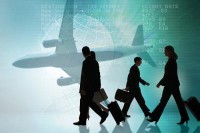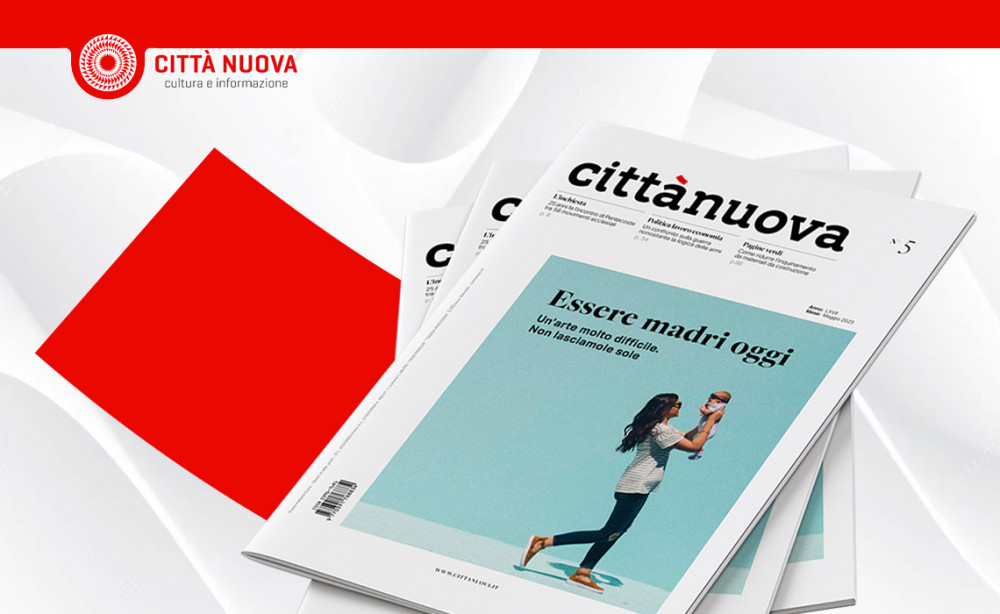Returning home, dreaming of communion also for that good half of the world that will never set foot in an airplane
by Luigino Bruni
published in Città Nuova n.17/2014 on 10/09/2014
 Returning from Paris, from a summer school on the Economy of Communion, flying up in the sky above Europe I am thinking about our capitalism. Perhaps because in France there is a newly appointed minister of economics, perhaps because I have just greeted fifty young people who are fascinated by a more fraternal and inclusive economy. Or perhaps because my heart goes out to too many aircrafts that are in the wrong, flying over many war-ravaged lands; I cannot help thinking of our market economy, our crises, the many Africans and North Africans I've seen in the subways of Paris and its existential, economic and cultural peripheries.
Returning from Paris, from a summer school on the Economy of Communion, flying up in the sky above Europe I am thinking about our capitalism. Perhaps because in France there is a newly appointed minister of economics, perhaps because I have just greeted fifty young people who are fascinated by a more fraternal and inclusive economy. Or perhaps because my heart goes out to too many aircrafts that are in the wrong, flying over many war-ravaged lands; I cannot help thinking of our market economy, our crises, the many Africans and North Africans I've seen in the subways of Paris and its existential, economic and cultural peripheries.
The first thing I ponder is what is happening in this plane between me (the other passengers) and the airline that is taking me home. I purchased a ticket, and in doing so I have completely moved into the logic of our capitalism. I made a contract with a major airline, a major player in the global economy (which buys, like other major airlines, many highly speculative financial stocks [hedge funds] to insure itself against the fluctuations of oil prices). To buy my ticket I used a credit card issued by one of the leading global financial circuits. Apart from me, this contract was closed also with a top manager normally travelling in business class, an Italian family (parents and three boys) who spent a few days of holiday in Paris and the young activist of an NGO who is returning from a conference where our economic system was criticised. The flight attendant smiles at me and treats me with much kindness, without actually knowing me, but that’s what her contract prescribes for her. And I am writing comfortably, using my PC produced by a large multinational.
And from this plane my thoughts also go to my predecessor at the University of Rome, who, two hundred years ago, in order to make the same trip to Paris took on perhaps a week's journey, had to cross mountain passes, running the risk of being trapped in the mountains, spending a fortune on the trip, and arriving physically destroyed. And I also think that there were very few people who had the means to go to Paris or to other European cities, their number must have been much lower than today.
So if we stopped at this point of the argument I would not feel too uncomfortable  about this flight as I remember the young people from different countries of the world that I have just left, with some nostalgia.
about this flight as I remember the young people from different countries of the world that I have just left, with some nostalgia.
In fact, there is much more to my ticket than that: hidden in it there is such 'a lot' that is hard to see, also because we have stopped asking ourselves some deep questions about the kind of world we have built around us. At the same time it is good to remember that I am travelling on a machine that is one of the main factors of pollution for our planet. It is true that among the programmes it offers aboard there is also the opportunity to make a donation to plant trees that would reproduce exactly the amount of CO2 that we are emitting, but by doing so it is asking us, private citizens to take responsibility for a social cost that this company generates and does not cover (or only in a small part). But then I think of all those citizens whom I have just come across in the metro, and who will probably never get on one of these planes, or just very rarely. In fact, there are less people travelling by air today than yesterday, because even if tickets cost relatively less today than ten years ago, the inequalities have increased, and today the life conditions of the poorest 10% in Europe have deteriorated, and it continues to worsen. Not to mention the billions of people in Africa, Asia and in many parts of South America, who not only do not fly, but they see the conditions of their environment worsen because of the flights of the richer 20% of the planet. Yet even these, and especially these people, would need to fly, to see the world, they need to take flights more than us, more than me, they need to fly and dream. But – and this is something that you do not speak about –if only 50% of those who today are excluded and trapped in the existential peripheries of the world began to fly in the sky, the planet would not be able to provide for our subsistence, and we would all have to get down to the ground. The sad message that lurks beneath this flight is very simple and should not let us travel in peace: the exclusion of one-half of the inhabitants of the planet from this wealth is the condition for us to be able to fly. That's why the real systemic risk of our time is that the many people who are forced to remain on the ground one day cease to peacefully watch the sky where only the others are flying.
And so, as we are landing now, my heart and mind return to the Economy of Communion, to those young people full of hope, and I feel convinced again that if there is a post-capitalist socio-economic system in which all can dream and fly, then this new system will have something to do with the word communion. But we won't ever realize it, unless we – whether we are flying or not – keep looking for it, thinking about it, loving it and believing it today.







